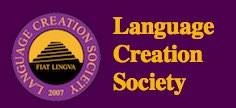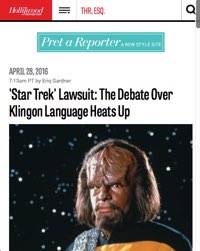Judge Avoids Klingon Language Copyright Issue
Table of Contents
Despite a clever, headline-grabbing effort by the Language Creation Society to draw attention to the copyright ability of constructed languages like Klingon, a federal judge turned aside an effort to attach the issue to the Axanar copyright infringement case.
Moot Issue
In an order issued January 5, 2017, federal Judge R. Gary Klausner said the issue of whether Klingon, or any other language, is entitled to copyright protection was rendered moot by his order earlier that week denying Axanar a fair use defense for copyright infringement:
[The] Language Creation Society … argues, in support of Defendants’ position in the cross motions for summary judgment, that the Klingon language should not be entitled to copyright protection. … The Court did not reach the issue of whether a language, and specifically the Klingon language, is copyrightable in the order.

Copyrighting a Language
In April 2016, Language Creation Society filed an amicus brief, partly written in Klingon, opposing Paramount’s claim of owning the copyright for the Klingon language, developed for the studio by linguist Marc Okrand for the film, Star III: The Search for Spock.
Language Creation Society
The mission of the Language Creation Society (LCS) is to promote the art and craft of language creation — free expression that would be stifled by allowing any language to be copyrighted:
Allowing copyright claims to a language would create a monopoly on use extending far beyond what is needed to protect the original work or to claim credit for the language’s creation. The potential threat of a lawsuit for merely using a conlang [constructed language], or creating new works to make it more accessible, has a chilling effect.1)
Not Affiliated with Axanar
While the LCS filed a brief alongside the defendants, the society emphasized it was taking no sides in the larger copyright dispute between CBS, Paramount and Axanar.
Substantial Similarity
The issue of whether a language can be copyrighted was first dealt with by Klausner in his May 9, 2016, order rejected Axanar’s motion to dismiss the case. The LCS had attached an amicus curiae (“friend of the court”) brief to that motion.
Klausner ruled the language issue was beside the point; Paramount’s claim that Axanar was using Klingon was only part of a larger test to determine whether Axanar’s use of many Star Trek elements, some of which might individually not qualify for copyright protection, was substantially similar in total to Star Trek.
The same reasoning appeared to be behind Klausner’s January 5 order, after having determined Axanar indeed qualified under an extrinsic, objective test to have infringed on Star Trek.
Disputing Copyright Claim
In its reply to the judge’s ruling, the society said in a statement posted on its website:
Paramount went beyond mere similarity by claiming copyright over the Klingon language. In doing so, they went too far, and claimed something that didn’t — couldn’t — belong to them: an entire language.2)
While acknowledging the judge’s finding that the Klingon language issue was “neither central nor dispositive to the case … Paramount chose to make it part of the case — and that required a response,” according to the statement.
Paramount 'Backing Down'
The statement went on to characterize the studios’ position as “backing down” from its original assertion that it owns the copyright to the language, a position many legal scholars believe is unsupported by copyright law:
The Court seemed persuaded by our position, writing that the Klingon language “may not be individually original and copyright protectable”. In its recent response to Axanar’s motion that the jury not be told about Klingon, Paramount backed down further, acknowledging the court’s skepticism and seeking only to use Klingon to show one of many alleged similar elements.
Keywords


